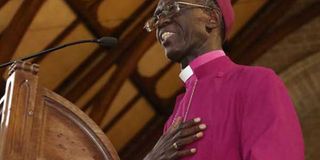Archbishop Wabukala warns on the evils of dirty cash

Anglican Church of Kenya Archbishop Eliud Wabukala at All Saints Cathedral in this picture taken on March 25, 2016. He is worried by money from tainted leaders as General Election draws near. FILE PHOTO | JEFF ANGOTE |
What you need to know:
- Eliud Wabukala said the donations enable the donors to hold the church to ransom as they turn the altar into a political arena.
- He said if the faithful paid their tithe (one tenth of produce or earnings) like the holy Bible demands, the church would be independent.
- Politicians are among the leading donors to the church today, with the frequency set to increase as the General Election draws nearer.
- Mombasa Bishop Julius Kalua and his Mt Kenya South counterpart Timothy Ranji banned politicians from using the church pulpit to campaign.
The church risks losing its moral voice if it continues to accept financial donations from politicians with questionable sources of wealth, Anglican Archbishop Eliud Wabukala has warned.
The primate, who retires this month, said the donations — which in some occasions have strings attached to them — enable the donors to hold the church to ransom as they turn the altar into a political arena.
“It is not tenable to rely on such donations. The cost is too high. I have been experimenting with a policy of keeping the altar away from politics at the All Saints’ Cathedral for three years now and it is working,” he said.
In an interview with the Sunday Nation, covering an array of subjects, the Anglican Church of Kenya (ACK) Archbishop said preachers are increasingly shying away from topics that they think may trigger an exodus of potential benefactors.
“You do not edit the Bible to tell people what they want to hear. In the long run, you are not helping them; you are only creating a false sense of reality which stands on quicksand.”
PAID THEIR TITHE
Archbishop Wabukala was enthroned at the All Saints’ Cathedral, Nairobi, on July 5, 2009, taking over from the Most Reverend Benjamin Nzimbi. He is also the chairperson of the National Anti-Corruption Campaign Steering Committee.
He said if the faithful paid their tithe (one tenth of produce or earnings) like the holy Bible demands, the church would be independent. There would be no need to call for fund-raising meetings to support the church’s programmes, he explained.
Politicians are among the leading donors to the church today, with the frequency set to increase as the General Election draws nearer.
Last month, Mombasa Bishop Julius Kalua and his Mt Kenya South counterpart Timothy Ranji banned politicians from using the church pulpit to campaign.
Mr Wabukala said that more than any other time in history, external donations had dwindled immensely, forcing the church to look for alternative sources to run programmes.
Religious worship has steadily declined in Europe for years, the traditional source of donations to Africa. Church authorities in the West are having to rethink the management of their huge — and expensive — estates, with some converting them into bars and others selling them.
Even as he leaves, the cleric said the work of Christ is yet to be accomplished. Many people are still not “churched”, he added.
ADOPTED EXTREME STANCE
“We have not arrived yet. We must soldier on and take the gospel to all and sundry,” he said.
He said that given the growing number of women clergy, the church would soon have a woman bishop. “There is actually no doctrine that bars women from running. With time, we will get there,” he said.
He also waded into the ongoing push by the opposition to have electoral commissioners quit on accusation of being inclined to favour the government. “Just like the opposition has adopted an extreme stance, the government, too, is rigid. We have serious reservations with the IEBC (Independent Electoral and Boundaries Commission), but dialogue on how to proceed is the only way out of this impasse.”
Highlights of the retiring Archbishop’s public life began with a scuffle pitting him against then powerful Rift Valley Provincial Commissioner Simeon Nyachae in 1970.
He had forgotten to put on his neck-tie that morning when he bumped into the abrasive PC under the Jomo Kenyatta regime while walking in the office corridors in Nakuru.
To make amends with an incensed son of Chief Musa Nyandusi, who made no concession on official dress code, the primate — then a clerical officer attached to the District Officer’s office — had to use the money he had intended for his lunch to buy a piece of that important attire.
Afterwards, there was no single day that he left behind his tie, whatever the weather. Fresh from school, he was 19 years that year.
This was before he switched from public service to the church later that decade. He also had a brief stint in teaching after attending Kaimosi Teachers’ Training College, which saw him serve as an inspector of schools.
Other key points of his life include Kenya’s quick recovery from the effects of post-election violence in 2007/08, to an increase in the number of Anglican dioceses from 31 in 2009 when he was sworn in, to 38 — with Kapsabet and Maseno East being the youngest.




